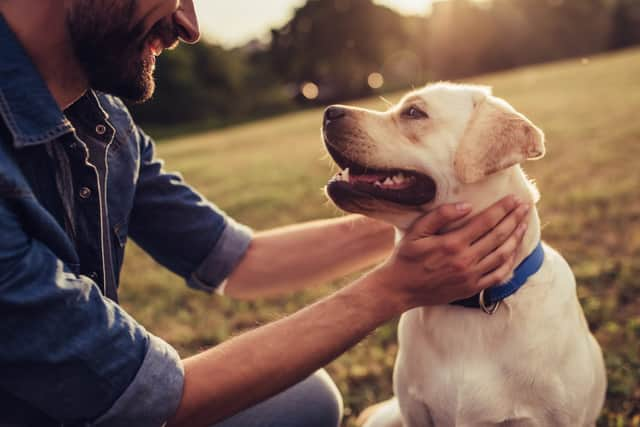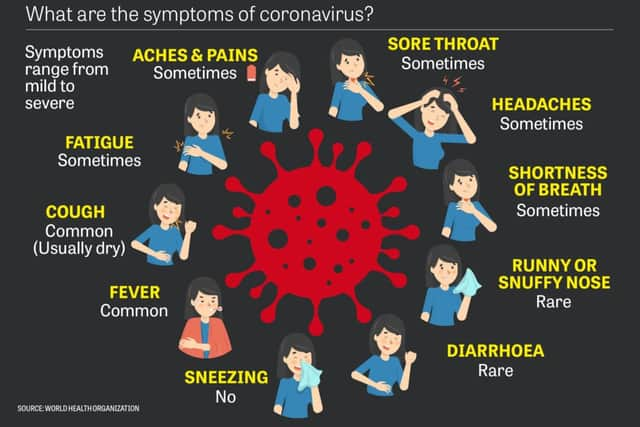Can your pet give you coronavirus? Here's what you need to know about animals and Covid-19
This article contains affiliate links. We may earn a small commission on items purchased through this article, but that does not affect our editorial judgement.


As cases of the Covid-19 strain of coronavirus continue to spread across the globe, there are growing concerns about how the virus is contracted.
These worries extend to our furry friends. With everyone taking precautions such as frequent hand washing to prevent the spread of germs, is it possible for our pets to contract and spread coronavirus?
Can animals get Covid-19?


Advertisement
Hide AdAdvertisement
Hide AdThe World Health Organisation (WHO) states, “At present, there is no evidence that companion animals/pets such as dogs or cats can be infected with the new coronavirus.”
However, the statement goes on to advise pet owners to maintain good hygiene, like washing their hands with soap and water after contact with their pets.
“This protects you against various common bacteria such as E.coli and Salmonella that can pass between pets and humans,” WHO said.
Can animals spread Covid-19?
According to PDSA advice, there’s currently no evidence that companion animals can spread Covid-19 to people.
Advertisement
Hide AdAdvertisement
Hide AdThe veterinary charity however states,“The virus is most commonly passed from person to person through coughing and sneezing. There is some evidence that the virus can live on surfaces for up to 24 hours, depending on the type of material, so it’s possible for the virus to be present on a dog or cat even if they can’t contract the illness themselves.”
PDSA advises pet owners to follow standard good hygiene practices, such as regularly washing their hands thoroughly with soap and hot water, especially after handling or feeding a pet, and avoiding letting pets lick their face.
The World Organisation for Animal Health says that the “predominant route or transmission of COVID-19 appears to be from human to human”.
Are there any known cases of coronavirus in pets?
A dog in Hong Kong recently was repeatedly tested as “weak positive” for the virus but experts say this should not lead people to panic.
Advertisement
Hide AdAdvertisement
Hide AdDr Jessica May, UK Lead Vet at video vet service, FirstVet said, “A dog recently tested mildly positive for the virus in Hong Kong, after swabs were taken from its nose and mouth. However, the dog was not showing clinical signs.
“The test results did not show that the dog was infected with COVID-19. The most likely reason for the dog to have mildly positive test results was due to breathing contaminated air from the owner, who had previously been diagnosed with COVID-19.”
A spokesperson for the Agricultural, Fisheries and Conservation Department (AFCD) advised that to ensure public and animal health, “mammalian pets of patients confirmed to have been infected with COVID-19 virus [were] to be put under quarantine by the AFCD”.
Are there other strains of coronavirus that can affect animals?
According to Dr May, “There are numerous strains of coronavirus that affect animals: canine coronavirus (CCV), which is highly contagious amongst dogs, and feline infectious peritonitis (FIP), which is an illness that can manifest from coronavirus infection in cats.
Advertisement
Hide AdAdvertisement
Hide Ad“These strains of the virus spread from animal to animal, but cannot be transmitted to humans.”
Coronavirus: the facts
What is coronavirus?
COVID-19 is a respiratory illness that can affect lungs and airways. It is caused by a virus called coronavirus.
What caused coronavirus?
The outbreak started in Wuhan in China in December 2019 and it is thought that the virus, like others of its kind, has come from animals.
How is it spread?
As this is such a new illness, experts still aren’t sure how it is spread. But.similar viruses are spread in cough droplets. Therefore covering your nose and mouth when sneezing and coughing, and disposing of used tissues straight away is advised. Viruses like coronavirus cannot live outside the body for very long.
What are the symptoms?
Advertisement
Hide AdAdvertisement
Hide AdThe NHS states that the symptoms are: a dry cough, high temperature and shortness of breath - but these symptoms do not necessarily mean you have the illness. Look out for flu-like symptoms, such as aches and pains, nasal congestion, runny nose and a sore throat. It’s important to remember that some people may become infected but won’t develop any symptoms or feel unwell.
What precautions can be taken?
Washing your hands with soap and water thoroughly. The NHS also advises to cover your mouth and nose with a tissue or your sleeve (not your hands) when you cough or sneeze; put used tissues in the bin immediately and try to avoid close contact with people who are unwell. Also avoiding touching eyes, nose and mouth unless your hands are clean.
Government advice
As of the 12 March the Government has moved into the "delay" phase of its plan to tackle coronavirus. Advice is that anyone with a continuous cough or high temperature should self-isolate for seven days. People over 70 have been advised not to go on cruises and schools advised to cancel trips abroad, though schools remain open.
Should I avoid public places?
Most people who feel well can continue to go to work, school and public places and should only stay at home and self isolate if advised by a medical professional or the coronavirus service.
What should I do if I feel unwell?
Advertisement
Hide AdAdvertisement
Hide AdDon’t go to your GP but instead call NHS 111 or look online at the coronavirus service that can tell you if you need medical help and what to do next.
When to call NHS 111
NHS 111 should be used if you feel unwell with coronavirus symptoms, have been in a country with a high risk of coronavirus in the last 14 days or if you have been in close contact with someone with the virus.
Sources: World Health Organisation and NHS